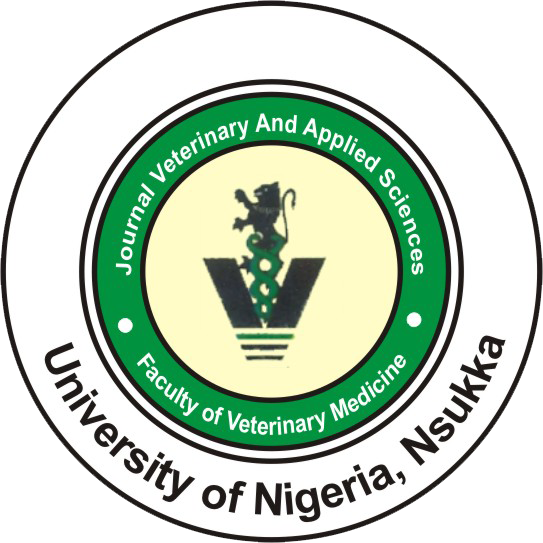University of Nigeria
ISSN: 2315 - 6856
e-ISSN: 2636 - 5553
Journal volumes
Powered by: RockSystems Global Services Ltd.
rocksystemsglobal@gmail.com (+2348035271306)
www.rocksystemsglobal.com
Volume 15, Issue 1: 2025 - Article 175
Abstract
Dengue fever is a mosquito-borne infection and a neglected zoonosis that endangers lives worldwide. It is often misdiagnosed as malaria. There is a paucity of epidemiological data on dengue virus infection (DVI) in Nigeria. The present study is a cross-sectional survey that determined the seroprevalence of DVI in human patients and dogs presented for veterinary care at hospitals in Nsukka, Enugu State, Nigeria. A total of 75 human patients and 21 dogs were sampled between May and August 2023. Sera obtained were tested for the presence of antibodies against DVI using a rapid diagnostic test kit. Data on risk factors associated with the infection were obtained with a pretested and validated structured questionnaire. Results showed that the seroprevalence of DVI in human patients was 29.3%, with 18.7% being active infections, 9.3% being passive infection, and 1.3% being active and passive infections occurring together. The overall seroprevalence in dogs presented at the veterinary hospital was 19.0%, all of which were active infections. Female human patients and dogs had a relatively higher prevalence than males, and human patients of 21 – 30 years of age had relatively higher prevalence than other age groups, but the recorded seroprevalence of DVI in both the human patients and dogs was not significantly (p > 0.05) associated with sex, age and pregnancy status, contact with dogs, bite of mosquitoes, among other variables. This study provided serological evidence of antibodies against dengue virus in human patients and dogs presented for veterinary care at hospitals in Nsukka, Nigeria. The findings in this study highlight the need for improved awareness, regular testing and one health approach to the disease surveillance and control.
Keywords: Dengue fever; Dengue virus; Seroprevalence; Human patients; Dogs; Hospitals; Nsukka Nigeria.
How to cite this article:
Nwankwo IO, Anyaoha CO, Ezeadichie EC, Asogwa NG and Ezenduka EV (2025). Serological evidence of active and passive dengue virus infection in human patients and
dogs presented for veterinary care at hospitals in Nsukka, Enugu State, Nigeria. Journal of Veterinary and Applied Sciences, 15(1): 903 – 915.
.
*Correspondence: E-mail: innocent.nwankwo@unn..edu.ng Phone: +2348036202116

Serological evidence of active and passive dengue virus infection in human patients and dogs presented for veterinary care at hospitals in Nsukka, Enugu State, Nigeria
Innocent O. Nwankwo *, Chidiebere O. Anyaoha, Emmanuel C. Ezeadichie, Nneka G. Asogwa and Ekene V. Ezenduka
Department of Veterinary Public Health and Preventive Medicine, Faculty of Veterinary Medicine, University of Nigeria, Nsukka, Enugu State, Nigeria.
Download .pdf copy here >>






